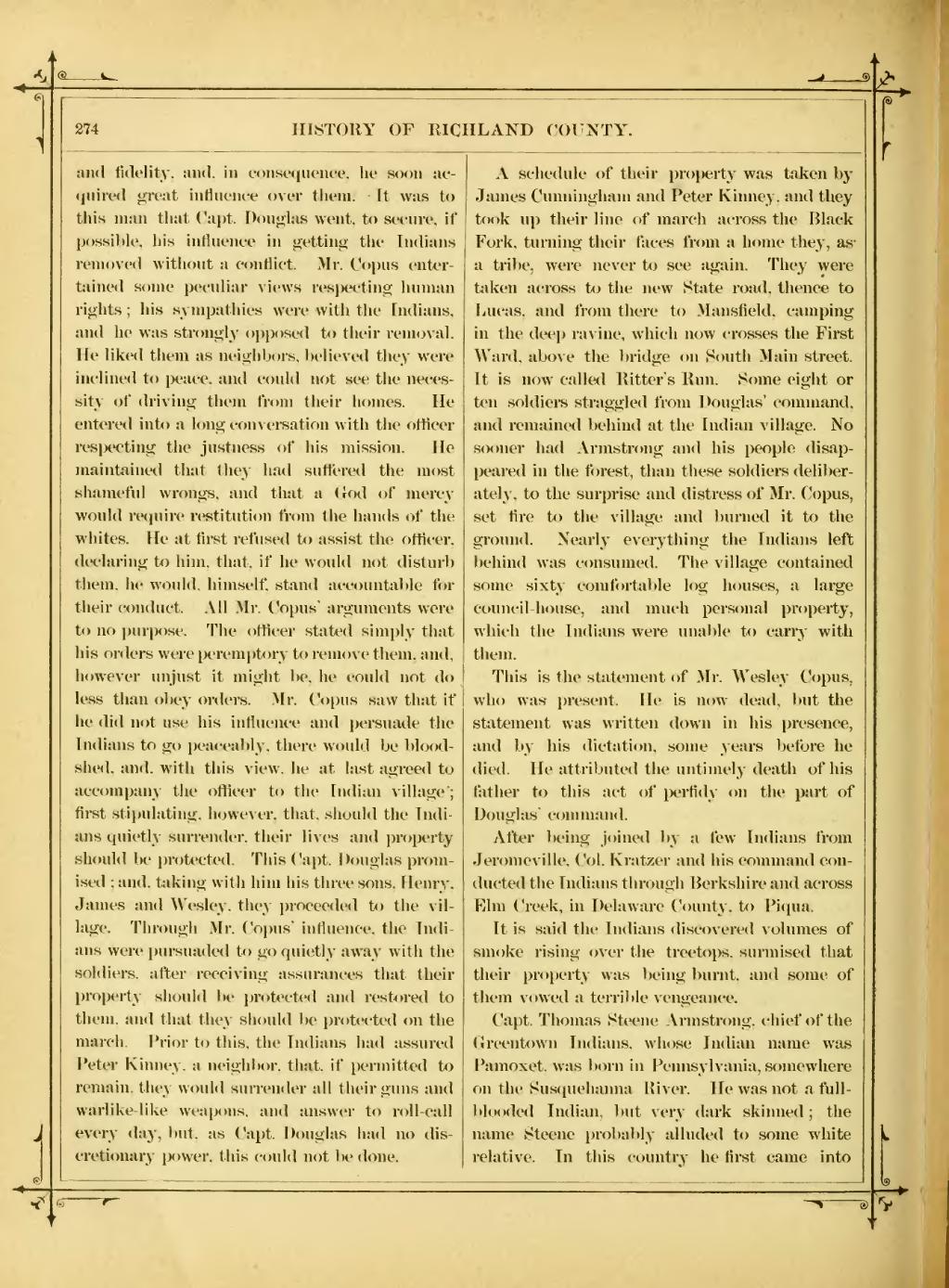-^
��274
��HISTORY OF RICHLAND COUNTY.
��and fidelity, and, in consequence, lie soon ac- quired great influence over them. It was to this man that Capt. Douglas went, to secure, if possible, his influence in getting the Indians removed without a conflict. Mr. Copus enter- tained some peculiar views respecting human rights ; his sympathies were with the Indians, and he was strongly opposed to their removal. He liked them as neighbors, believed they were inclined to peace, and could not see the neces- sity of driving them from their homes. He entered into a long conversation with the officer respecting the justness of his mission. He maintained that they had suffered the most shameful wrongs, and that a God of mercy would require restitution from the hands of the whites. He at first refused to assist the officer, declaring to him, that, if he would not disturb them, he would, himself, stand accountable for their conduct. All Mr. (1opus' arguments were to no purpose. The officer stated simply that his orders were peremptory to remove them, and, however unjust it might be, he could not do less than obey orders. ^Ir. Copus saw that if he did not use his influence and persuade the Indians to go peaceably, there would be blood- shed, and. with this view, he at last agreed to accompany the officer to the Indian village'; first stipulating, however, that, should the Indi- ans quietly surrender, their lives and property should be protected. This Capt. Douglas prom- ised ; and. taking with him his three sons, Henry, James and Wesley, they proceeded to the vil- lage. Through Mr. Copus' influence, the Indi- ans were pursuaded to go quietly away with the soldiers, after receiving assurances that their prc^perty should lie protected and restored to them, and that they should be protected on the march. Prior to this, the Indians had assured Peter Kinney, a neighl)or, that, if permitted to remain, they would surrender all their guns and warlike-like weapons, and answer to roll-call every day, but, as Capt. Douglas had no dis- cretionary power, this could not be done.
��A schedule of their property was taken by James Cunningham and Peter Kinney, and they took up their line of march across the Black Fork, turning their faces from a home they, as- a tribe, were never to see again. They were taken across to the new State road, thence to Lucas, and from there to Mansfield, camping in the deep ravine, which now crosses the First Ward, abo^e the bridge on South Main street. It is now called Ritters Run. Some eight or ten soldiers straggled from Douglas' command, and remained behind at the Indian village. No sooner had Armstrong and his people disap- peared in the forest, than these soldiers deliber- ately, to the surprise and distress of Mr. Copus, set fire to the village and bv;rned it to the ground. Nearly everything the Indians left behind was consumed. The village contained some sixtj- comfortable log houses, a large council-liouse, and much personal property, which the Indians were unable to carry with them.
This is the statement of ]Mr. Wesley- Copus, who was present. He is now dead, but the statement was written down in his presence, and by his dictation, some years before he died. He attributed the untimely death of his father to this act of perfidy on the part of Douglas' command.
After being joined by a few Indians from Jeromeville, Col. Kratzer and his command con- ducted the Indians through Berkshire and across Elm Creek, in Delaware County, to Piqua.
It is said the Indians discovered volumes of smoke rising over the treetops, surmised that their property was being burnt, and some of them vowed a terrilile vengeance.
Capt. Thomas Steene Armstrong, chief of the Greentown Indians, whose Indian name was Pamoxet, was born in Pennsylvania, somewhere on the Susquehanna River. He was not a full- blooded Indian, but very dark skinned ; the name Steene probably alluded to some white relative. In this country he first came into
��(s~
��rv
�� �
